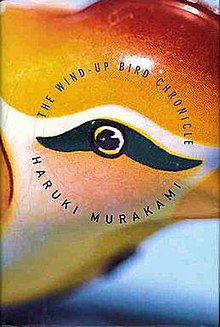The Wind-Up Bird Chronicle

First US edition cover
|
|
| Author | Haruki Murakami |
|---|---|
| Original title | ねじまき鳥クロニクル Nejimakitori Kuronikuru |
| Translator | Jay Rubin |
| Country | Japan |
| Language | Japanese |
| Published |
|
| Media type | Print (Hardcover) |
| Pages | 607 |
| ISBN | |
| OCLC | 39915729 |
The Wind-Up Bird Chronicle (ねじまき鳥クロニクル Nejimakitori Kuronikuru?) is a novel published in 1994–1995 by Japanese author Haruki Murakami. The American translation and its British adaptation, dubbed the "only official translations" (English) are by Jay Rubin and were first published in 1997. For this novel, Murakami received the Yomiuri Literary Award, which was awarded to him by one of his harshest former critics, Kenzaburō Ōe.
The original Japanese edition was released in three parts, which make up the three "books" of the single volume English language version.
In English translation, two chapters were originally published in The New Yorker under the titles "The Zoo Attack" on July 31, 1995, and "Another Way to Die" on January 20, 1997. A slightly different version of the first chapter translated by Alfred Birnbaum was published in the collection The Elephant Vanishes under the title "The Wind-up Bird and Tuesday's Women". In addition, the character name Noboru Wataya appears in the short story "Family Affair" in The Elephant Vanishes. While having a similar personality and background, the character is not related to the one in The Wind-Up Bird Chronicle of the same name. Noboru Wataya is also used in Jay Rubin's translation of the title short story in The Elephant Vanishes.
In May 2010, Harvill Secker published the Limited Centenary Edition of The Wind-Up Bird Chronicle to celebrate its one hundred years of publishing. It was limited to 2,500 copies.
The first part, "The Thieving Magpie," begins with Toru Okada, a low-key unemployed man, who is tasked by his wife, Kumiko, to find their missing cat. Kumiko suggests starting by looking in the alley, a closed-off strip of land existing behind their house. After hanging out there for a while with no luck, May Kasahara, who had been watching him camping out the alley for some time, questions him. She then invites him over to her house in order to sit on the patio and look over an abandoned house that she says is a popular hangout for stray cats. The abandoned house is revealed to possibly contain some strange omen, as it had brought bad luck to all of its prior tenants. It also contains an empty well, which Toru uses later on to crawl into and think.
...
Wikipedia
